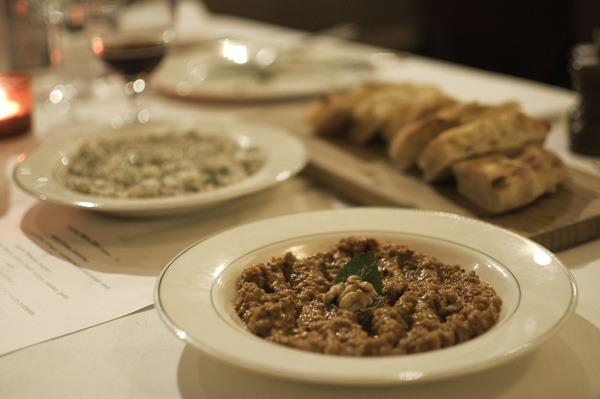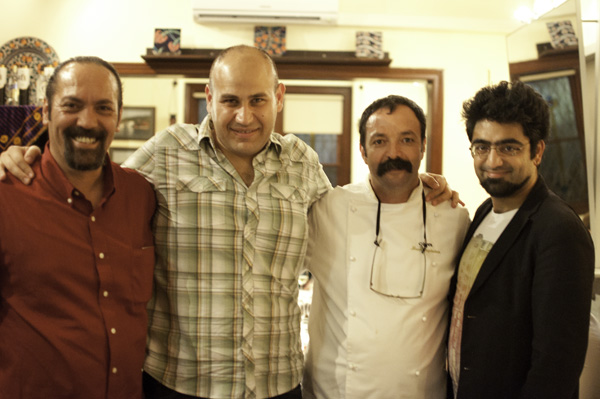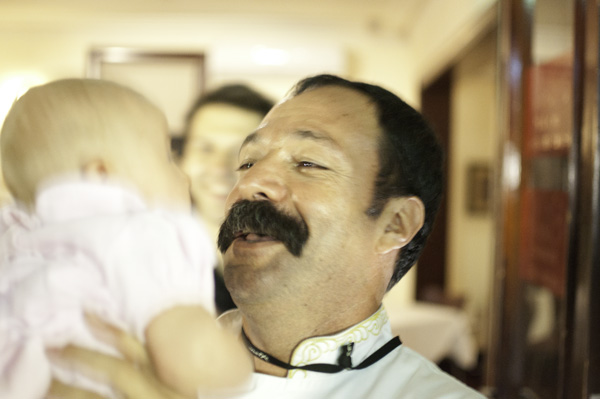I know. I’ve already written a post about the article I wrote for The Sydney Morning Herald Good Living. But hey, The Food Blog should feature the story too, right?
Here it is, once more, but this time, with some of my own photos.
Raki and Redemption – Dinner at Efendy, Balmain – Written for SMH Good Living

Cevizli Biber - Walnut and Red Capsicum Dip similar to Muhammara
Only recently, I was let in on a dark family secret. More than 100 years ago, my great-grandfather, known by the affectionate name Jiddi, a respected landowner and political leader in south Lebanon, was visited by a tax collector. At the time, Lebanon was under Ottoman rule and it was law to pay taxes to the Turks. Tax collectors were then, as now, not the most loved of people. Jiddi had had enough of handing out his hard-earned cash to a foreign occupier and in a fit of rage, or calculated cool, grabbed his knife . . . and the rest is history. True story.
More than a century later, I attend a presentation at the World Chef Showcase, part of the Crave Sydney International Food Festival. It is given by one of Turkey’s foremost chefs and food scholars, Musa Dagdeviren of Istanbul’s Ciya restaurant, aided by the head chef and owner of Balmain’s Efendy Restaurant, Somer Sivrioglu. Inspired, I book a table at Efendy for a meal cooked by Dagdeviren and Sivrioglu.

Murad, Me, Musa and my good friend Ludwig
Weighed down by the sin of my ancestry, I arrive at the dinner with two tokens of peace to offer my hosts. I have a small bottle of handcrafted orange blossom water from the Lebanese village of Maghdouche, famous for its perfumed orange trees. I also have a bottle of arak, called raki by Turks, an artisan, triple-distilled grape spirit mixed with aniseed made in Ain El Delb, the village of my birth. I hoped that at some point during the evening I would confess Jiddi’s story to my Turkish hosts and they would tell me it was all OK. To be on the safe side, I thought it best to do so towards the end of dinner to avoid getting kicked out too early during the feast.
What a feast it was. Dagdeviren’s food is honesty on a plate: unpretentious yet outspoken, unadorned yet full flavoured, seemingly simple but only achieved with an expert’s touch. It’s a skill Arabs describe as “forbidden ease”. Alaca corba is a prime example: a green-lentil and pearl barley soup from the city of Gaziantep, using just the right amount of tarragon and sun-dried pepper paste – two ingredients that could easily overpower – to create a fresh, wholesome and different starter. This is followed by a jump to Aegean Turkey and balik tursu, a ceviche-like dish of sea bream “cooked” by the acidity of lemon and paired with the classic Middle Eastern flavours: garlic and parsley. The fish is tender and sharp, while the flavour holds its integrity because of the absence of heat in its preparation. I love it. This is Turkish food I’ve never experienced before.
Even Dagdeviren’s pide and dips are far removed from Sydney’s Turkish scene. From south-eastern Anatolia comes dovme, a pearl barley and yoghurt dish that is all about lightness and texture. More familiar to my Lebanese palate is its companion, cevizli biber, from Hatay, a southern province of Turkey. This walnut and red-capsicum dip is sweet, smoky, earthy and spicy. Hatay borders Syria and the Turkish incarnation closely resembles and is equally as delicious as Syria’s muhammara.
A pattern emerges with every dish, each inspired by a different Turkish region. This is intentional and in line with the chef’s strong-held belief that food should be viewed and understood by regionality not nationality. The menu reflects his ethos wonderfully, reading as a culinary travel journal introducing us to the gastronomy of the poor, who Dagdeviren considers the truest of innovators in the culinary realm. We stamp our passport and move on to visneli kofte, a marvel of soft, marble-sized lamb meatballs cooked in a sour cherry and tomato stew. The dishes are so easygoing, so approachable. Real food, cooked by real people and perfected by a master.

Musa and my little girl
Downing raki between every memorable mouthful, I spot Murad Ilgicioglu, Dagdeviren’s assistant, also from Turkey. I invite him to our table. He holds my baby daughter to give me and my wife a moment of not having to be ambidextrous. We drink to each other’s health, laughing about the similarities between our cultures, while he explains the history of the various dishes. I like him and he seems to like us. In a moment of Dutch courage, I spill the beans and recount Jiddi’s story. He looks me straight in the eye and says without hesitation: “Tax collectors. The same happened even in Istanbul.” Instantly relieved, I realise nothing brings people together more than food and raki, other than perhaps a shared hatred of the taxman.
2 comments
Cok guzel abi
looks nice because l never tryed cevizli biber but added to my list now because will rock with some cold raki